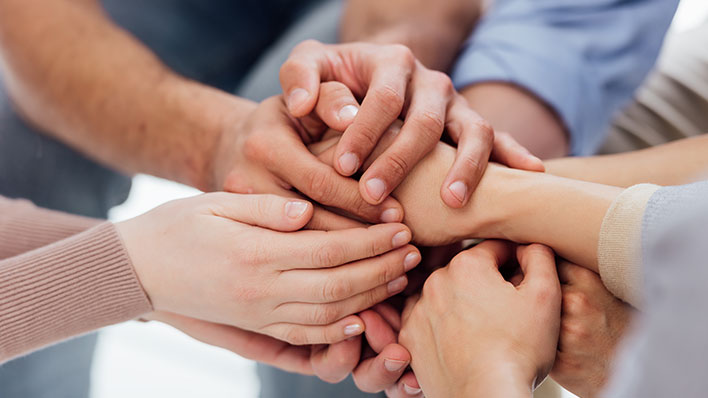Aftercare Program for Behavioral Health in Florida
Getting the right kind of care for behavioral health is an intimidating task for anybody seeking help. There are so many different forms of treatment available to those who are seeking help for their behavioral health needs.
The arena of behavioral health is complex; it’s imperative for those who received help to have some kind of plan in place for post-treatment life. This is why aftercare for behavioral health is so important.
Those who go through an entire treatment plan may think they are out of the woods, but it is just as imperative to seek help post-treatment. Aftercare for behavioral health at Ambrosia in South Florida ensures that those who have gone through the treatment process transition well into society outside the facility.
What is Aftercare?
 Aftercare in recovery refers to the ongoing support and treatment individuals receive after completing an initial phase of rehabilitation. This method of care plays a critical role in promoting long-term sobriety; it also helps to prevent relapse by providing continuous emotional support, counseling, and education on coping strategies. Aftercare can include various forms of behavioral therapy, support group meetings, and potentially even medication-assisted treatment. These treatment methods are all tailored to help individuals maintain their commitment to recovery in their daily lives.
Aftercare in recovery refers to the ongoing support and treatment individuals receive after completing an initial phase of rehabilitation. This method of care plays a critical role in promoting long-term sobriety; it also helps to prevent relapse by providing continuous emotional support, counseling, and education on coping strategies. Aftercare can include various forms of behavioral therapy, support group meetings, and potentially even medication-assisted treatment. These treatment methods are all tailored to help individuals maintain their commitment to recovery in their daily lives.
Aftercare is an essential aspect of the recovery process as it provides continued care and support for individuals as they transition back into their daily lives. It helps people not only maintain their sobriety but also address any lingering challenges that may arise during this time. This is important because it ensures sobriety and stability in the long-term.
Creating an effective aftercare plan is essential to ensure sustained health and well-being following any medical treatment or procedure. This plan should include detailed instructions for wound care, medication schedules, and signs of potential complications. Additionally, it should outline recommended dietary adjustments, physical activity levels, and scheduled follow-up visits with healthcare providers. The objective is to facilitate a smooth and speedy recovery, minimizing the risk of relapse or complications.
Aftercare programs play a vital role in supporting individuals as they transition back into society or continue their journey of recovery. These programs can take various forms, each tailored to meet specific needs. Therapeutic Aftercare focuses on continued counseling and therapy sessions to address underlying issues and ensure emotional stability. Educational and Vocational Aftercare programs aim at enhancing job skills and educational qualifications, preparing individuals for successful employment.
Community Support Groups, such as 12-step programs, provide a network of support, promoting shared experiences and collective healing. Lastly, Housing assistance programs offer stable living environments to those at risk of homelessness; this facilitates a secure foundation for rebuilding lives. Each type of aftercare program plays a critical role in long-term success and stability.
Aftercare in addiction recovery helps sustain long-term sobriety and prevents relapse. It provides individuals with continuous support through counseling, group therapy, and community meetings. These different methods provide a safe environment for sharing experiences and challenges.
Additionally, aftercare programs offer resources and tools to manage stress and triggers, thereby enhancing coping mechanisms. This ongoing support network is vital, assisting individuals in maintaining their recovery momentum. Aftercare also helps to integrate healthy habits into a person’s daily life, ultimately paving the way for a successful and lasting recovery.
A continuum of care refers to a comprehensive approach to healthcare that spans the entire range of a person’s medical needs. This approach goes from preventive care and primary care to acute care, rehabilitation, and end-of-life care. This model emphasizes the coordination and continuity of services; it aims to provide individuals with seamless care throughout their life stages, health states, and across various healthcare settings. Continuum of care also prioritizes patient-centered care. This ensures that each individual receives personalized, timely, and appropriate medical attention tailored to their unique health conditions and needs.
Goals Of Aftercare
Aftercare programs support individuals following a period of intensive treatment or recovery. The ultimate goal is to ensure a smooth transition into their daily lives while minimizing the risk of relapse. Relapse is scary, and it’s a harsh reality of recovery. Aftercare is about creating a safety net for those exiting recovery; it empowers individuals to maintain the progress they have achieved and continue on their path to long-term recovery and wellbeing.
The goals of aftercare also include the following:
- Providing continued emotional support
- Fostering a sense of community
- Reinforcing coping strategies
- Offering resources for sustainable health and wellness
The Role of Self-Care and Mindfulness in Aftercare
The role of self-care and mindfulness in aftercare cannot be overstated. These practices act as essential components in the recovery and healing process. They provide individuals with tools to manage stress, recognize early warning signs of relapse, and maintain mental and emotional balance.
Self-care routines, such as adequate sleep, healthy eating, and regular physical activity, lay a foundation for physical well-being; these strategies, in turn, support mental health. Mindfulness helps individuals to cultivate a deeper awareness of their thoughts and emotions. It achieves this through practices like meditation and focused breathing. This offers a pathway to greater calm and resilience in the face of life’s challenges. Together, self-care and mindfulness build a holistic approach to aftercare, emphasizing the importance of caring for the mind, body, and spirit.
Why is Self-Care and Mindfulness Important in Behavioral Health?
Self-care and mindfulness are pivotal in the realm of behavioral health for numerous reasons. They act as powerful tools in managing stress, anxiety, and depression by fostering a sense of inner peace and present-moment awareness. Engaging in self-care practices and mindfulness can enhance emotional resilience and personal well-being. This helps individuals to better cope with life’s challenges. These practices encourage self-compassion, allowing individuals to recognize and accept their feelings without judgment. This helps people achieve a healthier, more balanced mental state.
What are Some of the Other Resources Available in Aftercare Programs?
Aftercare programs often offer a variety of resources to support individuals in their recovery and reintegration into society. Some additional resources include legal aid services, designed to help with any legal issues or barriers; educational programs and vocational training to enhance job prospects; financial counseling to help manage debts and budgeting; and housing assistance to secure stable and safe living conditions. These holistic support systems are crucial for aiding individuals in rebuilding their lives and preventing relapse.
Are There Resources Outside of Traditional Treatment Settings for Aftercare?
There are numerous resources available outside of traditional treatment settings that can offer substantial support for aftercare. Community support groups, online forums, and mobile applications focused on recovery and mental health provide platforms for those leaving treatment; it allows them to share experiences, gain insights, and find encouragement. Additionally, holistic wellness activities such as yoga, meditation, and art therapy can serve as complementary aftercare practices. These methods foster mental, emotional, and physical well-being.
Assessing Individual Needs for Aftercare
Assessing additional needs for aftercare is crucial to ensure a comprehensive and effective recovery process. This involves evaluating the patient’s physical condition, psychological state, and social environment to identify any supplementary support or resources needed. Tailoring aftercare plans to address these specific requirements can significantly improve outcomes; it can also help individuals return to their daily routines with enhanced resilience and well-being.

How Can People Find Aftercare Support Programs?
Community centers, churches, and local non-profits might also host or have affiliations with aftercare groups, providing a more personalized support network. Finally, social media platforms and specialized apps have emerged as powerful tools for connecting individuals with aftercare programs and peer support groups. This has made it easier than ever to find the right kind of assistance.
Is Aftercare Right for Me?
Determining whether aftercare is right for you involves assessing your personal recovery needs and lifestyle. Aftercare programs offer structured environments that help in maintaining sobriety, managing stress, and building a supportive community. If you find yourself needing ongoing support to cope with recovery, aftercare might be a beneficial addition to your recovery process. It’s crucial to consider your unique situation, including your support system, risk factors, and personal recovery goals, when making this decision.
Find Healing and Recovery at Ambrosia Behavioral Health

Dr. Alam is an internationally renowned psychiatrist with academic affiliations with Northwestern University and University of Illinois, Chicago where he completed his residency training. He has been a principal investigator for over forty studies and has been involved in research leading to the approval of most psychiatric medications currently on the market. He is the founder of the Neuroscience Research Institute which continues to conduct research on cutting edge medication and interventional psychiatry. Dr. Alam is a Distinguished Fellow of the American Psychiatric Association and the American Society of Addiction Medicine. He has won several awards and has been featured extensively on radio and television.



